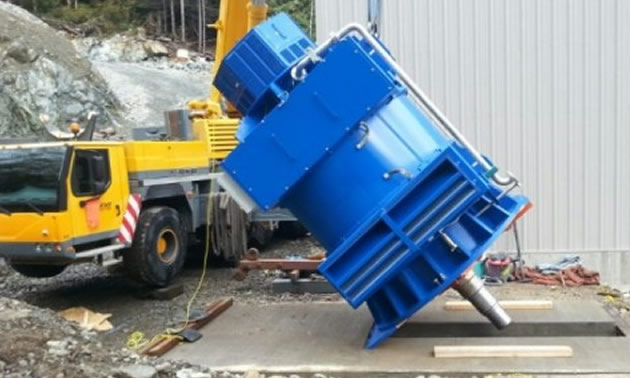Ehattesaht First Nation will take bigger stake in hydroelectric plant

A hydroelectric plant operated by the Ehattesaht First Nation will benefit from a $500,000 equity investment from the Province, allowing it to take advantage of an expansion of the clean-energy project.
Funding is provided through B.C.’s First Nations Clean Energy Business Fund (FNCEBF), which supports Indigenous communities in their efforts to pursue clean-energy projects. The FNCEBF supports CleanBC, the Province’s plan to build a cleaner future that creates opportunities for all British Columbians while protecting B.C.'s clean air, land and water.
The run-of-river hydroelectric plant has been operating for six years and is 20% owned by Ehattesaht First Nation. The infusion of funding will enable the Nation to purchase an additional stake in the plant, with the proceeds used to reduce long-term debt.
Operational in 2012, the plant is a 4.4-megawatt run-of-river generating station on Barr Creek, about 10 kilometres south of Zeballos. The project is 80% owned by Synex Energy.
The 2018 First Nations Clean Energy Business Fund also provided funds to six other First Nations to prioritize clean-energy equity projects in their communities. A total of $1.74 million in additional funding was granted to:
- Dzawada’enuxw First Nation — $500,000 to create a hydropower project to reduce its reliance on diesel power generation;
- Westbank First Nation — $150,000 to build a rooftop solar farm to demonstrate the viability of clean energy;
- West Moberly Frist Nation — $150,000 to help fund a biomass conversion project to heat the Twin Sister Native Plants Nursery;
- Tsilhqot’in National Government — $300,000 to support the redevelopment of an industrial brownfield into a solar farm;
- Homalco First Nation — $140,000 to implement a community energy plan that will introduce efficiency upgrades to homes and community buildings; and
- Hesquiaht First Nations — $500,000 for construction of a hydropower plant to reduce the use of diesel generators.
The FNCEBF also provided a combined $250,000 in capacity funding to seven First Nations to support clean-energy strategy and planning.
Applications for the next First Nations Clean Energy Business Fund intake will be accepted until the end of May 2019.
Chief Rose Ann Michael, Ehattesaht First Nation — “This is very exciting for Ehattesaht First Nation. Our community will benefit on two levels. The equity funding agreement allows us to purchase additional units in the project, which was one of the goals from the start. It will also allow us to have a clean-energy, revenue-sharing agreement. We are very pleased that our application was successful.”
Scott Fraser, Minister of Indigenous Relations and Reconciliation — “First Nations are moving forward with greener alternatives, such as solar, in meeting their energy needs. This work is an important part of our CleanBC strategy and supports self-determination. All of us in every area of the province have an important part to play in putting B.C. on a path that powers our future with clean, renewable energy and reduces air pollution.”
George Heyman, Minister of Environment and Climate Change Strategy — “Whether solar, wind or other clean-energy sources, the replacement of diesel generation with clean energy through these projects will help us use less fossil fuels while generating new economic activity, new jobs and building our clean economy. It’s important that the opportunities of our CleanBC plan are accessible to all British Columbians. That’s how rural and Indigenous communities can share in a more prosperous, balanced and sustainable future.”
Michelle Mungall, Minister of Energy, Mines and Petroleum Resources — “The First Nations Clean Energy Business Fund helps to bring ideas, vision and innovation to reality to meet CleanBC goals. By transitioning to cleaner electricity options, Indigenous communities can become more energy efficient while creating local jobs and economic opportunities.”
- The total annual budget is approximately $7.74 million for the FNCEBF for 2019-20.
- Since 2010, more than 110 First Nations have benefited from more than $10 million in capacity and equity funding.
- The B.C. FNCEBF provides equity funding to First Nations up to $500,000 for clean-energy projects, up to $150,000 in equity funding toward community energy projects (energy-efficiency, demand-side management and small fuel-switching projects) and capacity funding up to $50,000. Capacity funding supports community energy planning, feasibility studies for developing clean-energy projects or engagement with private-sector clean-energy project proponents.